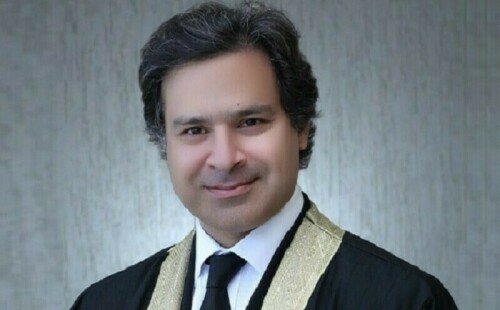ISLAMABAD, May 23: The draft of a 62-point constitutional package has been finalised and it includes a mechanism for reinstatement of the deposed judges.
This was stated by Pakistan People’s Party Co-Chairperson Asif Ali Zardari here on Friday. He said the draft would be provided to all coalition partners before it was tabled in parliament.
Mr Zardari, who was addressing the concluding session of a roundtable discussion organised by the South Asian Free Media Association, also said the government was determined to resolve all national issues in the spirit of democracy.
All deposed judges, including chief justice Iftikhar Mohammad Chaudhry, would be reinstated and economic problems would be addressed, he said.
Mr Zardari warned against what he termed giving democracy lessons to the PPP and said the party had rendered ‘maximum sacrifices’ before ascending to power.
Mr Zardari’s address was not on Safma’s schedule and the debate on ‘Media freedom and security’ was to be wrapped up by Information Minister Sherry Rahman.
He said the PPP was committed to restoring the Constitution in its original form. “Some friends have advised me to adopt a short cut, but my legal team does not agree with the idea”, he said.
Mr Zardari stressed that the PPP would not let the people down and said: “Shortly after coming to power, this government ended the detention of chief justice Iftikhar Chaudhry and his family. Lawyers had been struggling for months for that without any success.”
He said the constitutional package would be discussed with Prime Minister Yousuf Raza Gilani. (He went to the PM House in the afternoon reportedly for that purpose).
Mr Zardari said: “The nation must trust us. We are working to strengthen democracy, revive national economy and restore democracy. We will also restore the judges.”
He expressed the hope that the package might come up for debate in parliament ‘before or after the budget’.
Without directly mentioning the movement of lawyers or the civil society movement who want an early resolution of the judicial crisis, the PPP leader said: “Don’t coerce us and don’t tell us how to conduct politics. Let us take our own decisions.”
He said: “Nobody has offered more sacrifices for democracy than the PPP which has so far lost five members of the Bhutto clan and is still shouting ‘Pakistan Khappay’. It is ready to offer more sacrifices for achieving national objectives.”
“We must promote democracy. We cannot be taught how we have to achieve this,” he said.
He said that the government had inherited the food crisis and inflation from the previous government. “People ask me why were wheat prices high, why was petroleum so expensive and why were their sons jobless.”
He promised that prices of wheat and other food items would be brought down and the national economy would be managed in a better way, but people should remember that it had been only 60 days since the government had come into power.
Later, the PPP leader rejected reports that a charge-sheet was being prepared in the presidency against this government and went away saying: “Allah will help us!”
Earlier, the information minister said media criticism was ‘a blessing’ and every democratic government ‘takes full advantage of it for improving its performance’.
She said the government wanted Pemra to play the role of ‘a true regulatory body’ capable of generating its own funds and facilitating the media.
She said the draft of Access to Information Bill had been referred to the Ministry of Law and Justice for vetting and expressed the hope that the law would be adopted in ‘four to five months’.
She said that the interior ministry had assured her that it would submit its report on the assassination of journalist Mohammad Ibrahim in the tribal areas in 48 hours. “It will be made public.” Earlier, leaders of Safma and journalist unions in their speeches called for providing insurance cover to all journalists, especially those working in conflict zones like tribal areas and Balochistan, encouraging debate on corporatisation and monopolisation of journalism and implementation of the 7th wage board award.
Justice (retd) Tariq Mehmood said the nation had welcomed social galvanisation under the banner of freedom of judiciary and considered it the ‘basic ingredient for solving all ills’.
A resolution was adopted which endorsed the report on media laws and alternative media laws, replacing all ordinances issued by the previous government.
The conference supported PFUJ’s demand for implementation of wage board award while taking into consideration the inflationary pressures over the past seven years.
It demanded relaxation in the visa regime for journalists, writers and artists between India and Pakistan.















































Dear visitor, the comments section is undergoing an overhaul and will return soon.